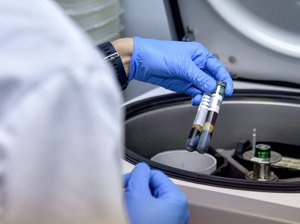Accreditation Restored at UK Equine Testing Lab


The Racing Medication and Testing Consortium has notified the University of Kentucky that the suspension of its Equine Analytical Chemistry Laboratory's accreditation has been lifted and assigned interim laboratory accreditation as of Dec. 23.
Nonconformities associated with RMTC's Laboratory Code of Standards, Section 2.4.9.2, triggered the suspension March 11. The Horseracing Testing Laboratory Committee, which is tasked with overseeing RMTC's Laboratory Accreditation Program, has completed its review of the UK lab's response and associated corrective actions and has determined that the laboratory has successfully fulfilled the designated requirements for accreditation reinstatement and is in compliance with RMTC's Laboratory Code of Standards.
UK-EACL has been assigned interim RMTC laboratory accreditation with a one-year monitoring period after which the lab will be eligible for full accreditation.
"The Racing Medication and Testing Consortium continues to serve the racing industry through the critical role of its Laboratory Accreditation Program," said Dr. Michael Hardy, executive director. "The importance of such a program is to assess and validate laboratory capabilities, which support industry regulation of anti-doping and medication control programs."
Hardy indicated he was confident the UK laboratory would see its full accreditation restored.
"We are confident with the mechanisms it has in place and the progress we've seen," he said.
The Horseracing Integrity and Safety Authority and its enforcement arm, Horseracing Integrity and Welfare Unit, began investigating the lab in February after receiving reports that the lab was not adhering to appropriate business practices in reporting equine drug tests and did not honor certain standards and obligations. An audit by the University of Kentucky led to the dismissal in March of Dr. Scott Stanley as the lab's director.
A report issued following a six-month investigation by HISA/HIWU noted the following:
- UK-EACL's failure to comply with mandatory testing specifications and instructions, including its standard operating procedures and sample analysis methods.
- UK-EACL misrepresented both its ability to test for specific substances, including erythropoietin (EPO), and the completion of analysis for certain substances on specific samples.
- At the direction of UK-EACL director Stanley, the laboratory failed to perform confirmatory analysis on 91 samples whose initial screening showed the potential presence of a prohibited substance and therefore required follow-up, instead reporting the samples as negative.
A statement issued by Stanley's attorney, Cristina Keith, after UK's audit report was released called the report inaccurate and said Stanley didn't intentionally do anything wrong.
"The characterizations of his actions in the audit are inaccurate, lack context, and do not take into consideration the complexities of the EACL's day-to-day operations," Keith wrote. "But, most importantly, Dr. Stanley denies the allegations of intentional wrongdoing contained in the audit. Dr. Stanley has committed his career to ensuring the integrity of scientific testing and safeguarding the trust placed in him and the institutions with which he is affiliated. … Dr. Stanley looks forward to providing a more complete and accurate account of the conduct addressed in the audit."
Nancy Cox, the dean of the UK College of Agriculture, Food and Environment, had previously outlined several steps that would be taken to restore the quality control at the lab that included hiring a quality assurance manager and instituting monthly meetings to review financial compliance, quality control, and general operations. The university also named Dr. Cynthia Cole, a national leader in the testing field, as acting director of the EACL. Cole immediately stepped in to address operational deficiencies and communicate with clients and other industry stakeholders.
Regarding the RMTC's recent action restoring the lab's re-accreditation, Cox said she was appreciative of this important step in restoring a critically important resource for Kentucky.
"As the consortium's executive director, Dr. Michael Hardy, noted in the announcement, a lab like EACL with the capacity to help ensure racing integrity and the well-being of our Thoroughbreds is central to the health of this critically important Kentucky industry," Cox said. "We are particularly grateful for the tireless and dedicated commitment of Dr. Cynthia Cole, who led the re-accreditation effort on behalf of UK and EACL."
